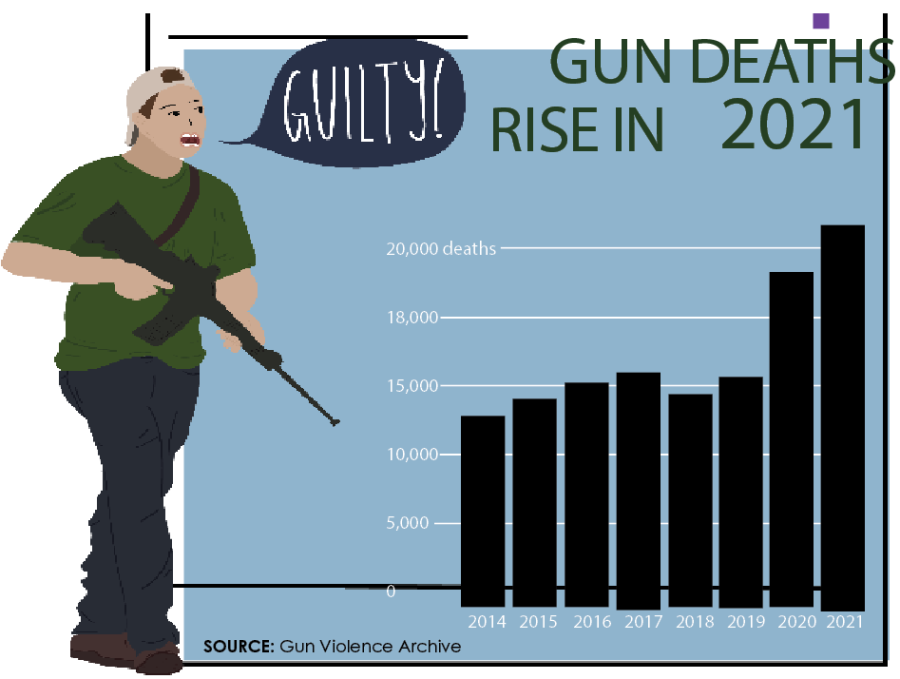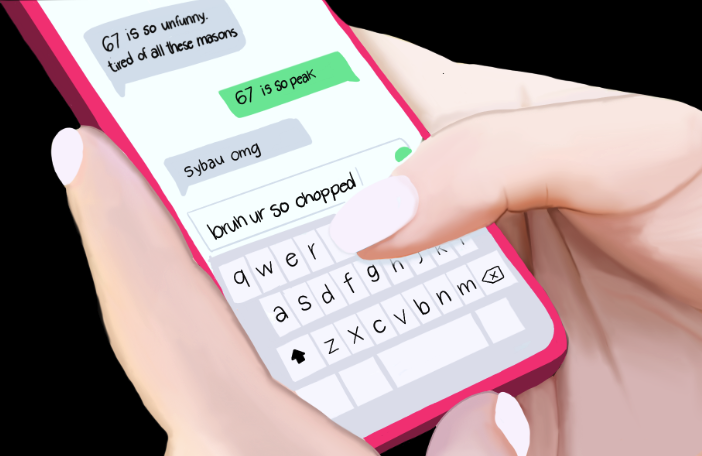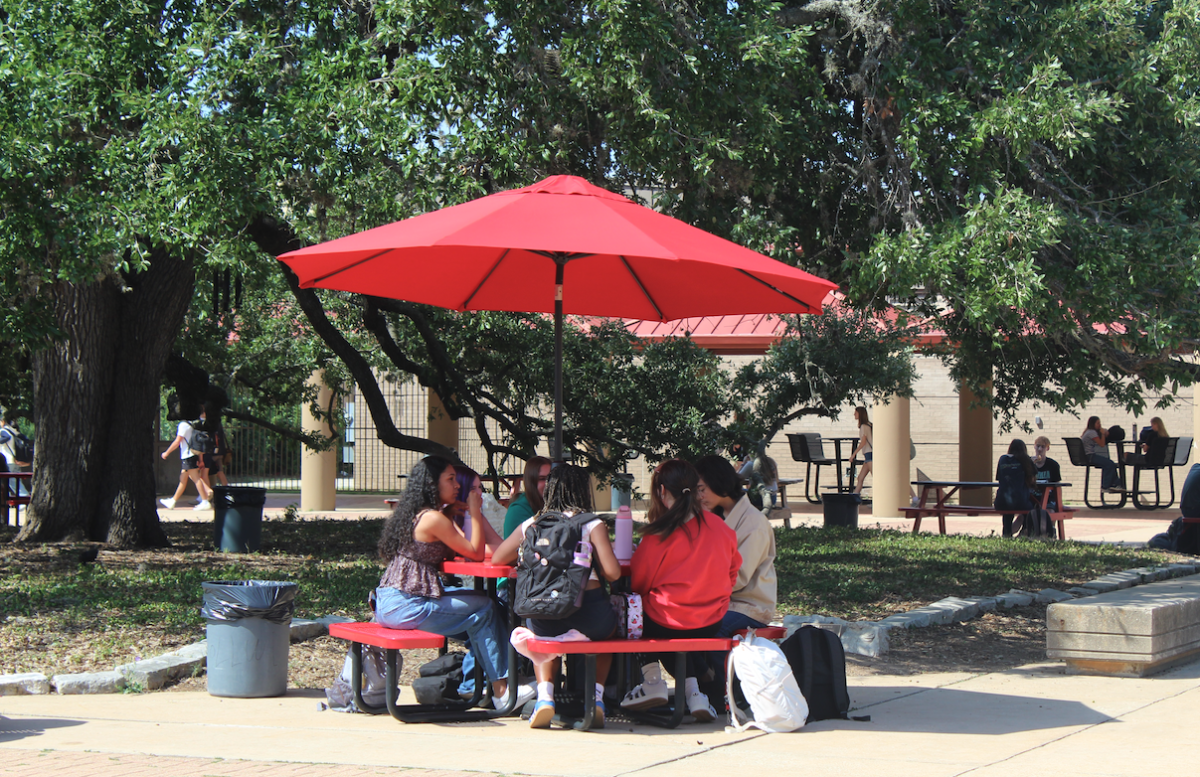Kyle Rittenhouse case exposes inequitable legal system
It is now the 21st century, where we are arguably a more developed society and in no need for every citizen to have a great deal of guns.
March 21, 2022
Six.
Six times Kyle Rittenhouse consciously moved his finger back and pulled the metal trigger of his AR 15- style rifle, while someone was at the other end of it.
I don’t know about you, but that’s six more times than I would want to ever hear the sound of a gun going off. Six more people that could have been killed from a gun. Six more mothers, fathers, children, friends, dying for no reason other than the easy access to a gun in America. Six more loved ones gone, with no goodbye.
This became reality on August 25, 2020. The shootings occurred in Kenosha, Wisconsin during the protests, riots and civil unrest that followed the shooting of a black man, Jacob Blake, by a white police officer that left Blake paralyzed from the waist down. Rittenhouse, 17 at the time, attended with a gun in hand.
Rittenhouse got into a quarrel with Joseph Rosenbaum, a 36-year old, unarmed Kenosha man. Rosenbaum ended up chasing Rittenhouse into a parking lot, where he was fatally shot four times at close range. Rittenhouse then fled being pursued by a crowd aiming to attack him. Anthony Hurber, 26, struck Rittenhouse with his skateboard and was returned with a fatal shot to the chest from Rittenhouse. In an attempt to end the bloodshed and stop a rifle-toting Rittenhouse, Gaige Grosskreutz, then 26, confronted him with a handgun of his own. Rittenhouse then shot Grosskreutz in the arm, which he survived. Hands in the air, Rittenhouse walked towards the police. Yet, he was not arrested on scene.
The truth is, six was only the amount of bullets that hit someone. Rittenhouse pulled his trigger an uncounted number of times otherwise.
Rittenhouse faced numerous charges including first-degree intentional homicide, first-degree reckless homicide, attempted first-degree intentional homicide, and two counts of first-degree recklessly endangering safety. At trial, Rittenhouse was found not guilty on all charges.
This case has brought a new layer of fire to the controversial 2nd Amendment debate alluding to the fearful usage of firearms in America. The amendment, ratified in 1789, was rooted in the popular desire to form state militias to frustrate any perceived overreach by the powerful federal government. Though, that was the 18th century.
It is now the 21st century, where we are arguably a more developed society and in no need for every citizen to have a great deal of guns. But somewhere in that time, the intent of keeping a single slow loading musket in your closet in case a militia is needed, to permit a 17-year old with a rifle slung around his neck to trudge around a riot and shoot those he perceives as a threat. I understand the need for safety, but a rifle, or any gun for that matter, does not bring safety. This case proves again that guns bring nothing but horror.
In a letter to the editor for the Los Angeles Times, Graham Martin wrote he feels “many in this country are so obsessed with guns and the 2nd Amendment that they cannot step back and see the mayhem they are causing.” There is a great truth to this statement. We as a country must step back and re-evaluate an amendment made over 200+ years ago.
Going extreme, the law dubbed “Kyle’s Law” has been proposed by a Tennessee lawmaker. The law, named in “honor” of Kyle Rittenhouse, requires the state to reimburse legal fees and lost wages if the person is acquitted of murder charges based on self-defense. In writing, this law sounds justified, but evaluating the manner of modern legal teams, played out it will protect people who should be found guilty like Kyle Rittenhouse.
It’s more than the 2nd Amendment, it is also the idea of white privilege. Though many are quick to disagree, this case would be completely different if Rittenhouse was black. Time and time again we’ve seen black people, who have done a lot less or nothing at all, lose their lives or get an unjust hearing. But white people do worse and walk free. Proof of this is clear in cases such as George Floyd, Breonna Taylor, Ahmuad Arbery, and many more that go back hundreds of years. Rittenhouse’s case brings up a great deal of controversial but necessary conversations.
Though Rittenhouse’s jury, made up of 20 jurors, 19 white and one Latino, was a unanimous verdict, the nation outside of the courthouse remains divided on broader cultural issues that overshadowed the case highlighting gun rights, vigilantism, and racial inequities in the justice system.
Though half of the world sees him as a hero, Kyle Rittenhouse was just an angry, armed white man, and that is the reason he was met with great legal and social deference in the court.
As of January 28, 2022, Kyle Rittenhouse walks free after murdering two people and injuring another. Oh, and he gets to keep nearly $1 million of his crowd-funded bail. He gets to grow up, go back to college, even pursue a “possible legal career,” his attorney, Mark Richards, says.
Justice, right? Not for the families and loved ones of Joseph Rosenbaum, Anthony Huber and Gaige Grosskreutz, the three men fatally shot and wounded by Rittenhouse.









